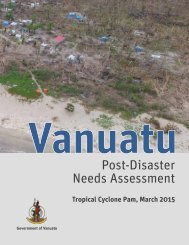Fiji
yqgk302EGjo
yqgk302EGjo
You also want an ePaper? Increase the reach of your titles
YUMPU automatically turns print PDFs into web optimized ePapers that Google loves.
FIJI Post-Disaster Needs Assessment<br />
Child Protection: An estimated 120,000 children have been moderately to severely affected (40 percent of the child<br />
population). Approximately 55 percent of schools and early childhood care and education centres were damaged or<br />
destroyed, disrupting schooling for almost 86,000 students. Use of violence against children is high with a baseline study<br />
on child protection in <strong>Fiji</strong> highlighting the acceptance of physical punishment as a means of disciplining children. Sexual<br />
violence against children is also high with almost one in five women sexually abused before the age of 15. Furthermore,<br />
Save the Children and the ILO highlight a significant market for child sex in <strong>Fiji</strong>. 128 In 2015, 115 cases of child sexual abuse<br />
were reported to the Department of Social Welfare and 612 child welfare cases were reported, including neglect, physical<br />
and emotional abuse, and severe malnutrition. As a result of the cyclone, increased stress on and vulnerability of families<br />
and caregivers, and abuse rates are expected to increase, with anecdotal reports from police and welfare officers already<br />
indicating the need for interventions. Continued support to the Ministry of Education’s programme in tracking children<br />
who may have moved schools or dropped out is required. Programmes to provide psychosocial support to children and<br />
caregivers are also needed to reduce the long-term impact of psychological distress.<br />
Disability Issues: The <strong>Fiji</strong> National Council for Disabled Persons estimated that 1 percent (11,402 people) of the <strong>Fiji</strong>an<br />
population is living with some form of disability. The Pacific Disability Forum further estimates that about 4,534 PLWD have<br />
been affected by the disaster; however, this figure could be higher as a result of injuries sustained during the cyclone.<br />
Disasters make the situation worse for PLWD, with regard to access to essential services, such as the challenges created<br />
by debris caused from the cyclone. Physiotherapy services for those recovering from injuries will also be needed. Efforts<br />
should be made to reach women with injuries who may not seek services or who may have family members that do not see<br />
the need to support them in seeking medical help. Disasters can lead to loss of or additional burdens on caretakers, who<br />
are often women. Efforts to identify, document and support people who have become disabled as a consequence of the<br />
disaster through social benefit schemes are essential. This support should include linking people with debilitating injuries<br />
to the disability community for social support. Close linkages between the MoHMS and the Department of Social Welfare<br />
and NGOs providing psychosocial support is needed.<br />
Gender and Social Inclusion Recommendations<br />
While women and different social groups have been disproportionally affected by TC Winston, simply viewing them as<br />
victims of the disaster only serves to exacerbate their vulnerability. As women’s contribution to the household economy is<br />
substantial, they will be a critical partner in the rapid recovery of <strong>Fiji</strong>an households and wellbeing and the entire affected<br />
population. Post-disaster recovery resources must strive to safeguard, restore and promote the economic engagement<br />
and participation of disadvantaged groups. Recovery efforts must redress gender inequalities or, at the very least, not<br />
perpetuate unequal access to power and resources. Such recovery strategies are outlined below.<br />
<br />
<br />
<br />
<br />
<br />
<br />
<br />
<br />
<br />
Targeted investment through extension, soft loans and skills development must be made in areas with a high<br />
representation of women, particularly in the informal sector in agriculture, markets and SMEs.<br />
<br />
especially in food crops controlled by women. Investment in subsistence agriculture must be done in tandem with<br />
non-farm skills and market development.<br />
<br />
inequality faced by women and vulnerable groups.<br />
<br />
jobs, such as community infrastructure rehabilitation and public works.<br />
<br />
families will be critical for ensuring that assistance reaches the most vulnerable groups, including pregnant women,<br />
the elderly and PLWDs.<br />
<br />
an integral part of recovery strategies for all sectors.<br />
<br />
toilets and wash facilities that allow privacy and protection.<br />
<br />
affected communities. Psychosocial support should be made available to men, women and children in the affected<br />
areas.<br />
128<br />
ADB 2015: <strong>Fiji</strong> Country Gender Assessment<br />
104 Tropical Cyclone Winston, February 20, 2016



